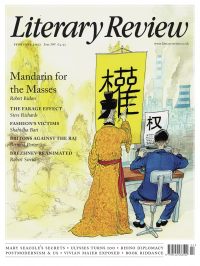Adam Douglas
Flog After Reading
It’s surprisingly hard to get rid of old books. I should know – I sell them for a living. The books I sell are rare first editions, often inscribed, sometimes of considerable historical or literary significance. A question I’m often asked is how I can bear to let these treasures go. There’s no difficulty at all. I’ve had my fun handling them in the shop. After a while, it’s a relief to see the back of them. And a financial necessity, or else I’d need to seek a new line of work.
Even people who don’t sell books for a living find it tricky to shift them. A friend of mine who wanted to relieve her sagging bookshelves downloaded a new app that scanned the ISBNs on her surplus paperbacks and told her which titles were desirable. All she had to do was pack up the saleable ones; a courier company would collect. She was paid £13 for a whole day’s strenuous work. At least she managed to clear space for more books.
In the past, she could have rung a second-hand bookshop, read out her most tempting titles over the phone, and waited for someone to make a

Sign Up to our newsletter
Receive free articles, highlights from the archive, news, details of prizes, and much more.@Lit_Review
Follow Literary Review on Twitter
Twitter Feed
It wasn’t until 1825 that Pepys’s diary became available for the first time. How it was eventually decrypted and published is a story of subterfuge and duplicity.
Kate Loveman tells the tale.
Kate Loveman - Publishing Pepys
Kate Loveman: Publishing Pepys
literaryreview.co.uk
Arthur Christopher Benson was a pillar of the Edwardian establishment. He was supremely well connected. As his newly published diaries reveal, he was also riotously indiscreet.
Piers Brendon compares Benson’s journals to others from the 20th century.
Piers Brendon - Land of Dopes & Tories
Piers Brendon: Land of Dopes & Tories - The Benson Diaries: Selections from the Diary of Arthur Christopher Benson by Eamon Duffy & Ronald Hyam (edd)
literaryreview.co.uk
Of the siblings Gwen and Augustus John, it is Augustus who has commanded most attention from collectors and connoisseurs.
Was he really the finer artist, asks Tanya Harrod, or is it time Gwen emerged from her brother’s shadow?
Tanya Harrod - Cut from the Same Canvas
Tanya Harrod: Cut from the Same Canvas - Artists, Siblings, Visionaries: The Lives and Loves of Gwen and Augustus John by Judith Mackrell
literaryreview.co.uk